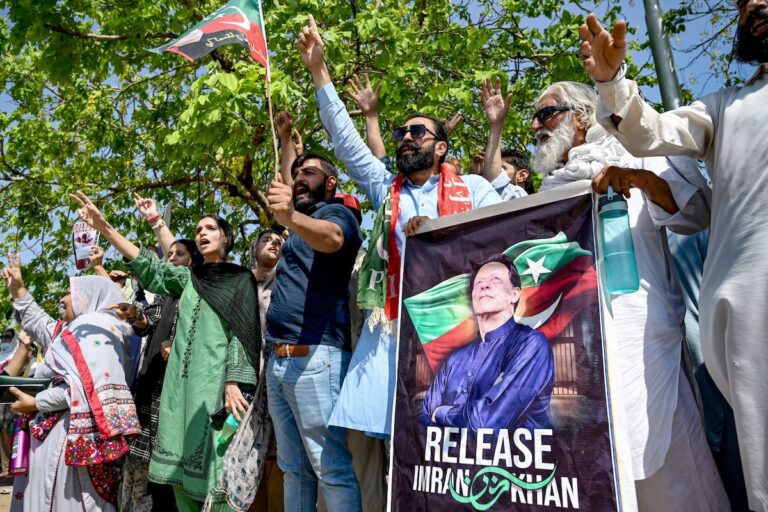Rashid Hussein Said is a Toronto-based journalist and consultant specializing in energy and politics, with a focus on the Middle East.
Supporters of Imran Khan, a former prime minister of Pakistan and leader of the Pakistan Tehreek-e-Insaaf (PTI), celebrated outside a court in Islamabad on July 13 after a court ruling overturned his illegal marriage conviction. Khan remains in jail on charges of inciting riots.Amir Qureshi/Getty Images
Pakistan, the world’s fifth most populous nuclear-armed country, is on the brink of a revolution, or at least a judicial revolution.
Pakistan’s leading army officers have long considered themselves the country’s ultimate saviours and protectors, but as the judiciary begins to assert its power after more than two years of blatant control, the power of a few top military officials to micromanage Pakistan’s political horizon is beginning to be questioned.
Pakistan’s Supreme Court, in an 8-5 majority decision on July 12, declared that imprisoned former prime minister Imran Khan’s party, Pakistan Tehreek-e-Insaf (PTI), is entitled to its fair share of parliamentary seats reserved for women and religious minorities. The ruling overturned an earlier decision by the Election Commission of Pakistan (ECP) to award PTI seats to the military-controlled ruling coalition led by Prime Minister Shehbaz Sharif.
The ruling was a major blow to Sharif and the military, who were denied a two-thirds majority in parliament. “The Supreme Court has overturned a historic fraud against the PTI,” Pakistan’s leading daily newspaper Dawn wrote in an editorial this weekend. “The ruling will hopefully prevent the kind of blatant fraud that characterized the last general election. The government and the establishment must not allow the ruling to be impeded in its implementation.”
“This order condemns the ECP’s actions that have been detrimental to Pakistan’s democratic process,” constitutional law scholar Rida Hossain told Al Jazeera. “Election monitoring bodies have a constitutional obligation to be independent and impartial, but they have acted against a major political party and illegally denied the PTI its right to vote.”
As the Christian Science Monitor reported last month, “It is an open secret in Pakistan that the case against Khan is being pursued by the military leadership, which has long been seen as a puppet of Pakistani politics. The military leadership has historically found a cooperative partner in the higher judiciary, but that relationship has become increasingly strained in recent months as the judiciary has sought to assert its independence.”
This reawakening is not a one-time event but a process, and the recent majority decision of the Supreme Court is just the latest (and perhaps most fatal) blow to the generals’ influence.
The judiciary’s new resolve began to take shape in April when six of the eight judges of the Islamabad High Court penned a joint letter detailing the pressure they faced while hearing cases against Khan and his party. The judges alleged that the powerful Joint Military Intelligence Agency engaged in acts of intimidation and threats, including kidnapping and torturing relatives of judges and installing cameras in their bedrooms. In one case, they said, they were pressured to continue hearing the case against Khan even after a majority had ruled it could not continue.
A few weeks later, the then chief justice of the Lahore High Court took a firm stance against the ECP, which was trying to ensure that the petition by Khan and his party challenging the results of the fraudulent February elections would be heard only by a panel of judges, including retired judges, who would be appointed by the ECP and not accountable to any judicial authority.
Similarly, a lower court judge who was hearing a case against members of Khan’s party following allegations of violence during protests by PTI supporters on May 9, 2023, accused intelligence agencies of trying to coerce him into ruling against the PTI.
Some analysts believe the Supreme Court’s decision was also intended to block the government from securing the two-thirds majority that would allow it to amend the constitution. The government is also believed to be considering extending the term of Pakistan’s current Chief Justice Qazi Faez Isa, whom Khan has accused of being pro-PTI and subservient to the establishment.
These amendments have been blocked but big questions remain: When will the jailed former prime minister be released? When will the true will of the Pakistani people be reflected in Parliament? And with the government announcing an appeal against the Supreme Court verdict and plans to completely ban the PTI for accepting foreign funds and orchestrating riots, will the verdict be upheld?
The results of these questions will determine who rules Pakistan — and whether it will be by ballot or by bullet.

